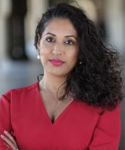 ACR CONVERGENCE 2021—The field of medicine requires an internal cultural shift to be ready for the next pandemic and address challenges that started before the COVID-19 pandemic, such as provider burnout, noted Seema Yasmin, MD, clinical assistant professor of medicine in primary care and population health at Stanford University, California
ACR CONVERGENCE 2021—The field of medicine requires an internal cultural shift to be ready for the next pandemic and address challenges that started before the COVID-19 pandemic, such as provider burnout, noted Seema Yasmin, MD, clinical assistant professor of medicine in primary care and population health at Stanford University, California
Dr. Yasmin presented the ACR Convergence 2021 keynote on Friday, Nov. 5, sharing her thoughts and comments in a discussion-based format with ACR President David Karp, MD, chief of the Division of Rheumatic Diseases at UT Southwestern Medical Center, Dallas.
Originally from London and born to parents from South Asia, Dr. Yasmin studied to be a physician in the U.K. and came to the U.S. to specialize in disease outbreaks with the U.S. Centers for Disease Control and Prevention (CDC). Dr. Yasmin’s time at the CDC colored her perspective on health outbreaks and public health communications.
“No matter where I was sent, there were rumors and so much disinformation and misinformation. Yet in public health, we were so focused on a pathogen and not [these other things],” she said.
This experience led her to study journalism at the University of Toronto and focus on medical myths and the spread of misinformation related to health issues. Dr. Yasmin has since worked as a reporter for the Dallas Morning News, winning an Emmy Award for her reporting. She has also served as a medical analyst for CNN.
Provider Burnout & Challenges
Returning to pre-pandemic normal may not be the right goal, Dr. Yasmin said. Medical professionals and the world will still face a climate crisis, supply chain issues and health provider burnout, issues that predate the pandemic.
“When we do exit the pandemic, if we sigh a massive sigh of relief and go back to business as usual, we will have failed,” Dr. Yasmin said. “I want us to create a new normal that is more resilient and less vulnerable.”
Dr. Yasmin commented on the mental health struggles providers face now, including suicide and other mental health issues. Changing this problem requires a shift in how medical professionals think about healthcare provider wellness.
“We need a culture change. It’s a difficult thing to do, but it’s critical,” she said.
Vaccine Hesitancy
The pandemic has also shed light on the lack of scientific literacy in the general public, Dr. Yasmin said. For example, she cited advice from Anthony Fauci, MD, chief medical advisor to the U.S. president and director of the U.S. National Institute of Allergy & Infectious Disease, early in the COVID-19 pandemic that masks were not needed, but then shortly thereafter said masks were important. He followed the science. The evidence about mask use changed, so he changed his position.




